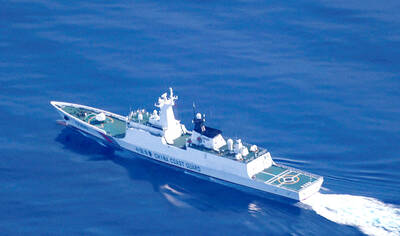A security deal to allow some US troops to stay in Afghanistan to fight al-Qaeda was at risk of collapse yesterday after Afghan President Hamid Karzai said he was prepared to walk away from negotiations.
The US has pushed for the bilateral security pact (BSA) to be signed by the end of this month so that the US-led NATO military coalition can schedule its withdrawal of 87,000 troops by the end of next year.
However, Karzai said he refused to be rushed into signing the deal, and would first seek approval from a traditional grand assembly to be convened in a month’s time.
“The agreement has to suit Afghanistan’s interests and purposes. If it doesn’t suit us and if it doesn’t suit them, then naturally we will go separate ways,” Karzai said in a BBC interview in Kabul.
According to the Afghan government, talks ground to a halt over US demands for the right to conduct unilateral military operations after next year, and on how the US would pledge to protect Afghanistan.
US Secretary of Defense Chuck Hagel last week described the deal as “critically important” and said he hoped it would be signed by the end of the month.
The collapse of a similar agreement with Iraq in 2011 led to the US pulling all its troops out of the country, which is currently suffering its worst sectarian violence since 2008.
However, Kabul has dismissed the possibility that the US may enact the “zero option” of a complete pull-out.
US and Afghan negotiators held their latest round of talks on Monday, focusing their attention on two sticking points.
Afghanistan wants US guarantees against future foreign intervention, a veiled reference to neighboring Pakistan.
Kabul accuses its neighbor of harboring the Taliban and other extremists who enter Afghanistan and then cross back into Pakistan, where they cannot be attacked by Afghan or US-led international forces.
The second sticking point is the role and conduct of the counterterrorism force the US wants to leave behind.
“The United States and its allies, NATO, continue to demand even after signing the BSA they will have the freedom to attack our people, our villages,” Karzai said on Monday.
Karzai’s outburst came in response to a question about a NATO air strike on Friday last week in Nangarhar Province.
The US-led coalition said its forces struck insurgents trying to attack the base and that no civilians were harmed, but Kabul claims five civilians were killed.
After Karzai’s comments, Washington said it remained committed to talks and urged Kabul to stay focused on concluding the deal.
US President Barack Obama this week said he would consider a limited US mission after this year only if the Afghan government “was willing to work with us in a cooperative way that would protect our troops.”
The US wants to keep as many as 10,000 troops in Afghanistan to go after the remnants of al-Qaeda, but if no agreement is signed, all US troops would have to leave by Dec. 31 next year and it is unlikely that NATO or any of its allies will keep troops there either.

‘HYANGDO’: A South Korean lawmaker said there was no credible evidence to support rumors that Kim Jong-un has a son with a disability or who is studying abroad South Korea’s spy agency yesterday said that North Korean leader Kim Jong-un’s daughter, Kim Ju-ae, who last week accompanied him on a high-profile visit to Beijing, is understood to be his recognized successor. The teenager drew global attention when she made her first official overseas trip with her father, as he met with Chinese President Xi Jinping (習近平) and Russian President Vladimir Putin. Analysts have long seen her as Kim’s likely successor, although some have suggested she has an older brother who is being secretly groomed as the next leader. The South Korean National Intelligence Service (NIS) “assesses that she [Kim Ju-ae]

In the week before his fatal shooting, right-wing US political activist Charlie Kirk cheered the boom of conservative young men in South Korea and warned about a “globalist menace” in Tokyo on his first speaking tour of Asia. Kirk, 31, who helped amplify US President Donald Trump’s agenda to young voters with often inflammatory rhetoric focused on issues such as gender and immigration, was shot in the neck on Wednesday at a speaking event at a Utah university. In Seoul on Friday last week, he spoke about how he “brought Trump to victory,” while addressing Build Up Korea 2025, a conservative conference

China has approved the creation of a national nature reserve at the disputed Scarborough Shoal (Huangyan Island, 黃岩島), claimed by Taiwan and the Philippines, the government said yesterday, as Beijing moves to reinforce its territorial claims in the contested region. A notice posted online by the Chinese State Council said that details about the area and size of the project would be released separately by the Chinese National Forestry and Grassland Administration. “The building of the Huangyan Island National Nature Reserve is an important guarantee for maintaining the diversity, stability and sustainability of the natural ecosystem of Huangyan Island,” the notice said. Scarborough

DEADLOCK: Putin has vowed to continue fighting unless Ukraine cedes more land, while talks have been paused with no immediate results expected, the Kremlin said Russia on Friday said that peace talks with Kyiv were on “pause” as Ukrainian President Volodymyr Zelenskiy warned that Russian President Vladimir Putin still wanted to capture the whole of Ukraine. Meanwhile, US President Donald Trump said that he was running out of patience with Putin, and the NATO alliance said it would bolster its eastern front after Russian drones were shot down in Polish airspace this week. The latest blow to faltering diplomacy came as Russia’s army staged major military drills with its key ally Belarus. Despite Trump forcing the warring sides to hold direct talks and hosting Putin in Alaska, there